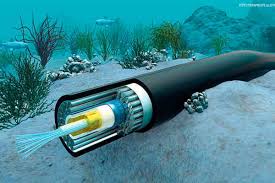Islamabad, Dec 26: Pakistan is set to witness a significant boost in internet speed and reliability as a new undersea internet cable with a capacity of 24 terabytes is being installed. This ambitious project, undertaken by a French company, spans an impressive 45,000 kilometers and aims to complement the existing seven cables that currently offer an aggregate bandwidth of 8 terabytes. Once operational, the new cable is expected to address persistent issues with slow internet speeds and provide enhanced connectivity nationwide.
The cable will directly connect Pakistan and the African region, expanding the nation’s global digital infrastructure. According to Sajjad Mustafa Syed, Chairman of the Pakistan Software Houses Association (P@SHA), the cable is still under installation and is anticipated to become operational next year.
He also shared that additional projects are underway, including four major internet lines and infrastructure designed to support 5G. These initiatives aim to alleviate bandwidth congestion and enhance fiber connectivity for mobile towers, effectively doubling Pakistan’s internet capacity within the next year.
Syed emphasized the long-term benefits of these developments, predicting that the enhanced infrastructure will meet the nation’s internet demands for the next two to five years. However, the government is under increasing scrutiny from the tech community, digital rights advocates, and freelancers due to ongoing internet outages, slow speeds, and the controversial installation of a national firewall.
These disruptions have caused significant economic losses, with Pakistan’s IT sector reportedly losing over one million dollars per hour during internet shutdowns. Syed highlighted the economic potential of investing in digital infrastructure, noting that for every dollar invested in market access, $49 in returns is generated, based on recent trends.
Meanwhile, Parliamentary Secretary for the Cabinet Division Syed Sajid Mehdi has advised citizens to limit internet use to “important matters only” to alleviate the strain on the country’s connectivity. Mehdi attributed slow speeds to overuse and the country’s limited fiber-optic capacity, which he noted is just 15% compared to India’s 45%. His comments came amid widespread frustration over inadequate internet services and infrastructure.
In parallel, Minister of State for IT and Telecom Shaza Fatima Khawaja informed the Senate Standing Committee on IT earlier this month that Pakistan is exploring collaborations with Starlink, the satellite internet constellation developed by the US-based SpaceX. If successful, Starlink’s integration could further bolster Pakistan’s digital connectivity and improve access in underserved regions.
These developments signal a concerted effort to upgrade Pakistan’s digital infrastructure, addressing current challenges and positioning the country for a more connected future.
